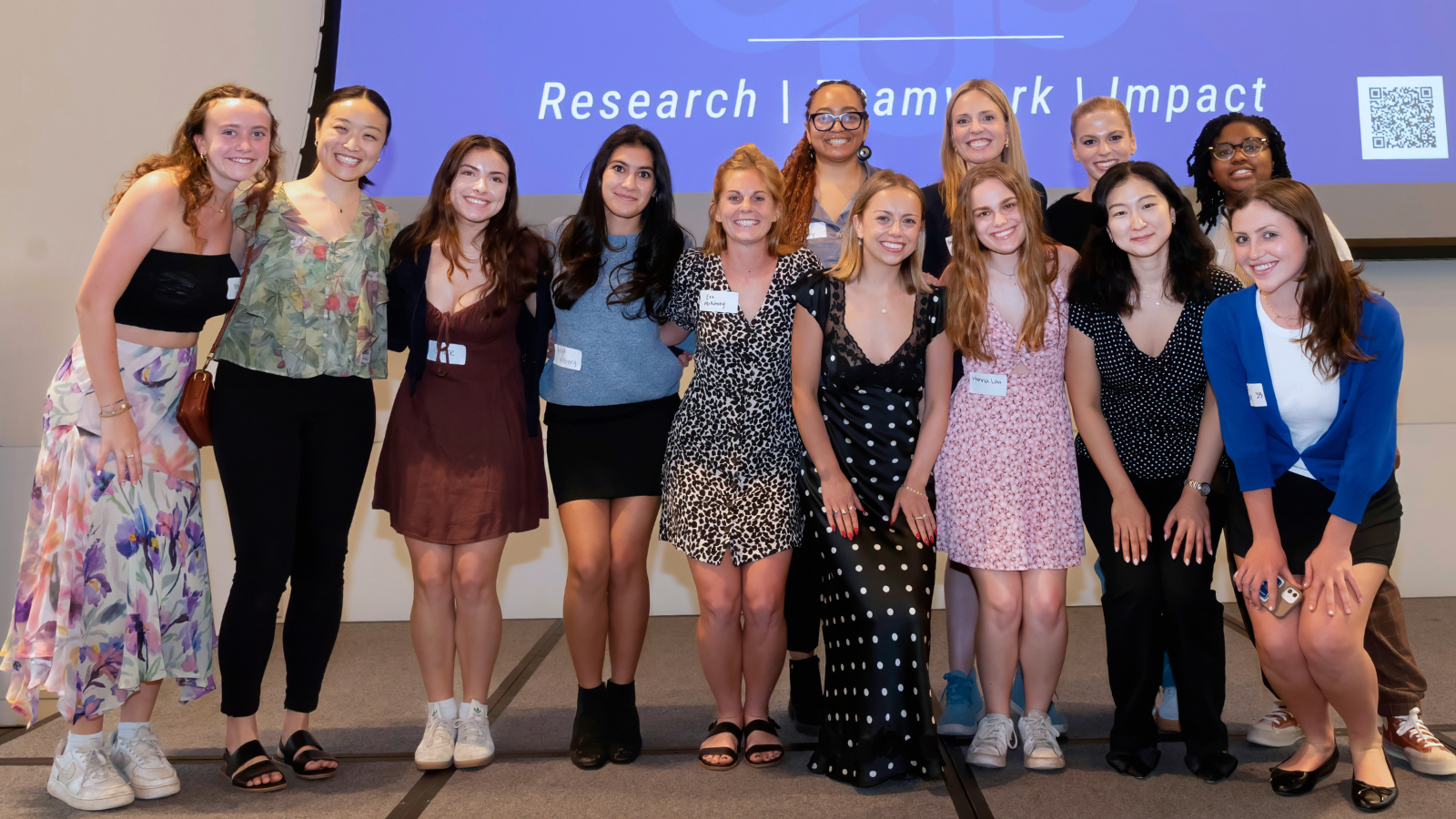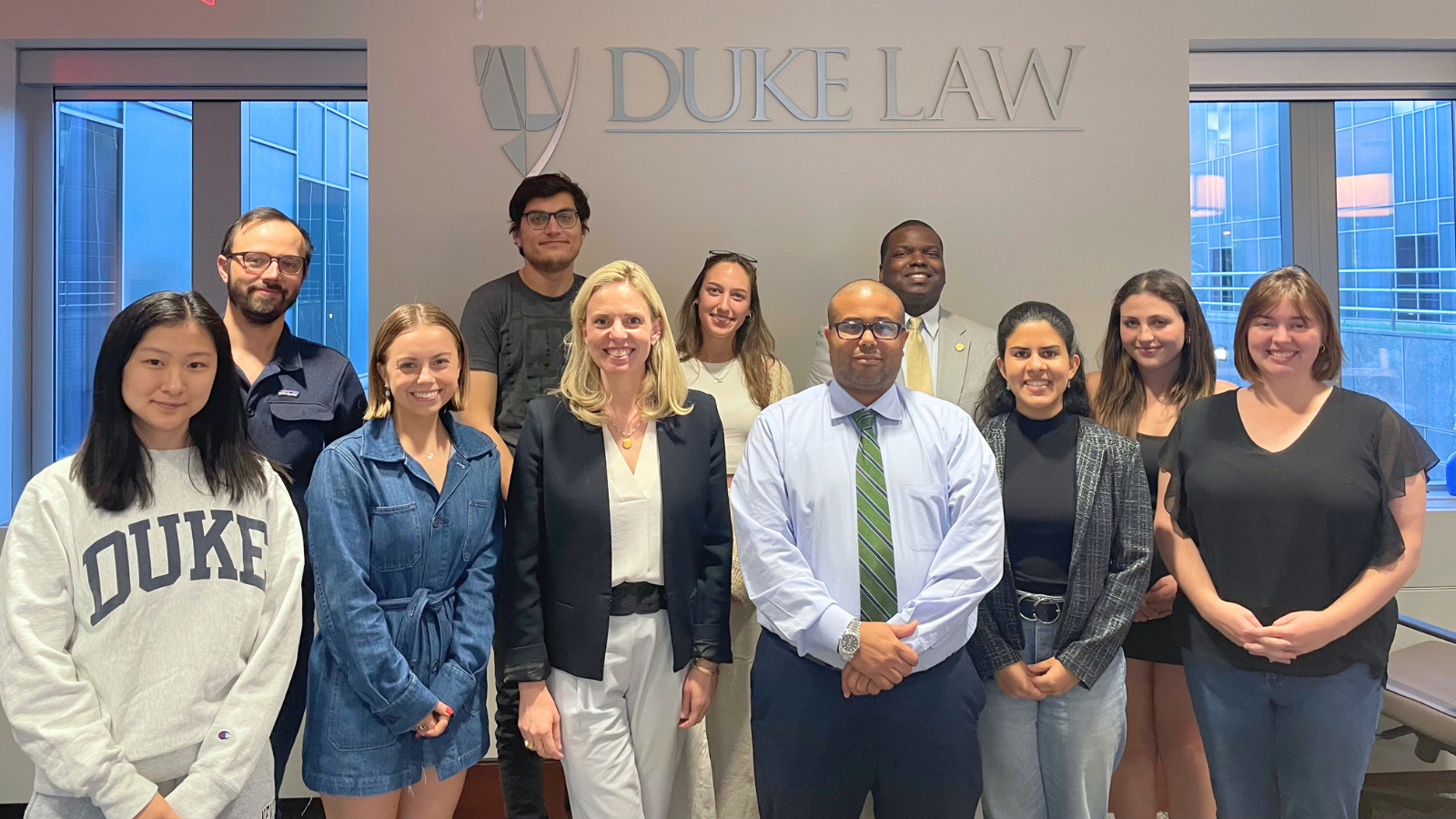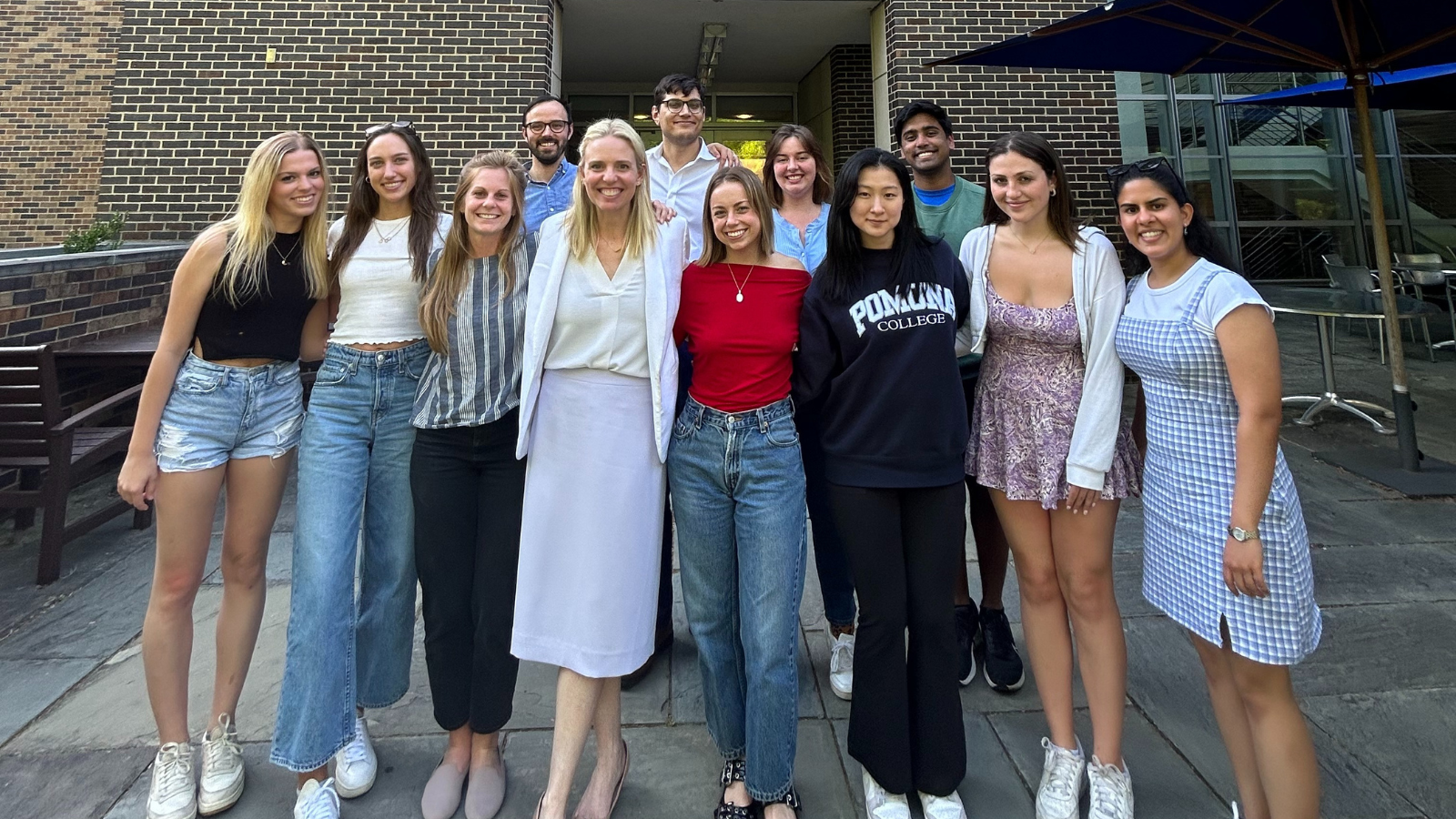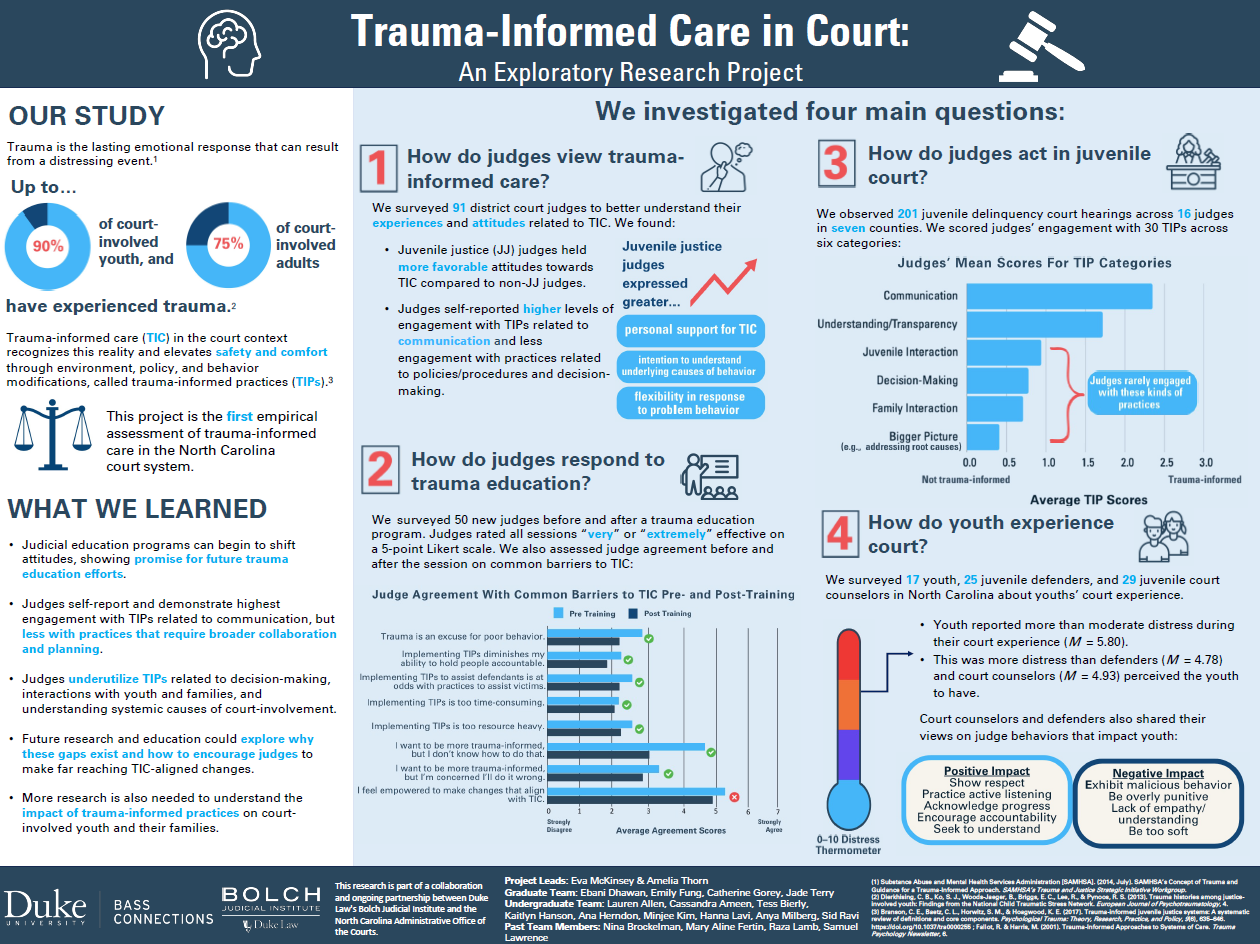Investigating the Landscape of Trauma-Informed Practice in North Carolina Courts
Project Team

Team profile by members of the A Trauma-Informed Approach to Court: An Exploratory Research Project team
North Carolina is part of a movement to make courts more trauma informed. However, the movement lacks research about trauma-informed practice in the judicial context. Our team was created to fill this gap. In 2022-23, we surveyed judges to assess their perceptions of a trauma-informed approach and created and used an observation tool to assess the use of trauma-informed practices in juvenile court.
In 2023-24, we analyzed court observation data and surveyed youth and court personnel to build knowledge of youths’ court experiences. We also drafted several papers on our findings for publication. Our work has the potential to shape judicial education and motivate judges to transform their courtrooms.
Background
Trauma and its impacts are profoundly relevant in the criminal legal system. Research shows that trauma can impact brain and body development in ways that alter a person’s fear responses, decision-making skills and perceptions of the world around them. Trauma can make it more likely for a person to be involved in the criminal legal system, and failure to address trauma can make it more difficult to exit the system.
Research also shows that involvement in the criminal legal system can traumatize, or re-traumatize, some people. But research also shows that the brain can heal. As Cassie Ameen, a junior studying public policy, said, “I’ve learned from the community members who have spoken to our class that often, the children who are entering the courtroom are victims of a cycle of trauma and violence. However, this does not mean that the cycle cannot be broken.”
For these reasons, stakeholders increasingly acknowledge that trauma-informed practice in the courts can lead to better outcomes for people in the criminal legal system. North Carolina has taken significant steps to adopt a trauma-informed approach in their court system since 2021.
For example, Chief Justice Paul Newby created the Chief Justice’s Task Force on ACEs-Informed Courts, the Bolch Judicial Institute at Duke Law – the academic leader of the task force – authored a bench card for judges that recommends specific trauma-informed practices, and the state has offered multiple educational opportunities for judges focused on trauma education.
When these efforts began, many judges were posing the same question: What is the evidence surrounding trauma-informed practice in courts? Judges told us they would be more likely to adopt such practices – and encourage their colleagues to do the same – if they were armed with these data. Our Bass Connections team was created to help build this evidence base.

Our Team
Our team consisted of students across Duke, including undergraduate students, law students, data science master’s students, cognitive neuroscience doctoral students, and bioethics and policy students. Amelia Thorn, a law professor and an assistant director at the Bolch Judicial Institute who also served on the Chief Justice’s Task Force, and Eva McKinsey, a social and community psychologist who has focused her work on trauma-informed practices, led us in our research.
The class met regularly to explore topics related to the science of trauma and judicial practice, and heard from judges, doctors, court administrators, district attorneys, public defenders, psychologists, court counselors and social workers from around the state. The class also worked in subteams to develop expertise in particular areas and propel certain projects forward.

Our Research Questions and Findings
Across two years, we asked four key research questions. We describe our methods and select findings related to each question below:
1. What are North Carolina judges’ attitudes related to trauma-informed practice?
In fall 2022, we surveyed North Carolina district court judges, asking them about their experience with trauma education, attitudes toward trauma-informed care and implementation of specific trauma-informed practices. We administered the survey to approximately 100 district court judges.
After administering the survey, team members spent the next year understanding the theory animating the survey, familiarizing themselves with the validated scales included in the survey, learning the basics of R Studio (a statistical analysis tool), analyzing data from the survey and writing sections of a manuscript to report findings.
We found that:
- Judges working in juvenile justice at the time of the survey (JJ judges) held more favorable attitudes toward trauma-informed practice compared to non-JJ judges (i.e., judges working in adult criminal court).
- Judges self-reported higher levels of engagement with trauma-informed practices related to communication and less engagement with practices related to policies/procedures and decision-making.
2. How do judges respond to trauma education?
In summer 2023, the Bolch Judicial Institute, led by the two Bass Connections team co-leads, created the first-ever trauma education program for approximately 50 new judges (district court judges in the state sworn in within the prior year) as part of new judges’ orientation.
The course included sessions on trauma and the brain, the trauma-informed care movement in North Carolina, implementing trauma-informed practices in court, addressing barriers to implementation, and lived experience of trauma and the court system. The course concluded with a skills workshop. To evaluate the program, we conducted a survey before and after to assess judges’ attitudes related to trauma-informed practice.
We found that:
- Judges expressed slightly more favorable views toward a trauma-informed approach after the program.
- Judges generally showed less agreement with common barriers to implementation of trauma-informed practice after the program (e.g., less agreement with statements like, “trauma is an excuse for poor behavior,” or “implementing trauma-informed practices diminishes my ability to hold people accountable”).
3. In what ways are judges practicing trauma-informed practice in NC juvenile delinquency court?
In fall 2022, a subteam developed an observational instrument to measure engagement with trauma-informed practices in court. Having piloted and refined the instrument throughout the school year, a group of five students, along with the two team co-leads, spent the summer of 2023 officially conducting court observations for the study.
The group observed 201 juvenile delinquency court hearings across 16 judges in seven counties throughout North Carolina, scoring presence or engagement with over 60 trauma-informed environmental conditions or practices across nine categories.
We found that:
- Judges’ engaged most with practices related to communication (e.g., greeting the youth and parents; mean score of 2.35 out of 5) and understanding/transparency (e.g., explaining what was happening at the hearing; M = 1.72).
- Judges rarely engaged in practices related youth interaction (e.g., conversing with the youth in a constructive way; M = 0.94), decision-making (e.g., considering less restrictive measures when creating an order; M = 0.78), family interaction (e.g., involving the family in a constructive way; M = 0.71), and “bigger picture” items (e.g., trying to get at the root cause of the behavior; M = 0.41).
4. How do youth experience court?
In fall 2022, the team created surveys for youth involved in the court system about their experiences in court. In fall 2023, the team refined and distributed these survey to youth. However, due to the shifting nature of many juvenile court dockets and other challenges, the team found it difficult to survey a sufficient number of youth for the study.
To supplement our youth responses, we surveyed court counselors and defenders – two groups that work closely with youth in court. These groups answered questions about how they perceived experiences of the youth they had encountered.
In total, the team surveyed 17 youth, 25 juvenile defenders and 29 juvenile court counselors from across the state. In addition to descriptively analyzing survey data to better understand youths’ experience in court, we linked survey responses to observation data to test for correlations between judge behavior and youths’ experiences.
We found that:
- Youth reported more than moderate distress during their court experience (a mean of 5.80 out of a possible maximum of 10).This was more distress than defenders (M = 4.78) and court counselors (M = 4.93) perceived the youth to have.
- Court counselors and defenders shared their views on judge behaviors that impact youth, identifying a host of both positive (e.g., acknowledging progress, seeking to understand) and negative approaches (e.g., being overly punitive, or lacking empathy).
- Correlations between judge behavior and youths’ court experience (as perceived by court personnel) varied greatly depending on the category of judge behavior (e.g., communication, youth interaction) and court personnel group (defender vs. court counselor). For example, while judge behavior was significantly correlated with the amount of distress defenders perceived youth to have, some judge behavior (e.g., communication) was negatively correlated to the amount of distress court counselors perceived youth to have (i.e., the more trauma-informed judge behavior, the less distress).
***
The Bass Connections experience is unlike any other, both for undergraduate participants new to research as well as for graduate team members poised to take on important leadership roles. The project afforded students a rare opportunity to design a study from the very start and to create (from scratch) the tools that would help direct the research. It equally allowed them to consider the broader potential impacts of the research.
Ameen said she had “fallen in love with the open nature of [the] classroom – which has welcomed all types of discussions from the super-specifics of our project to the aims of our project as a whole.”
The promise of the class’s work is exciting to legal leaders in the North Carolina community as well.
“The research being done as part of Duke’s Bass Connections program will allow judges to better understand trauma-informed practices, hopefully inspiring even more judges to adopt these measures in their own courtrooms,” said Corpening.
The experience has left an indelible impression on students. “When I talk about college to my kids,” said junior Sid Ravi, “I will talk about observing courts for a summer or doing research in a law school class.”
Trauma-Informed Care In Court: An Exploratory Research Project
Poster by Amelia Thorn, Eva McKinsey, Catherine Gorey, Kaitlyn Hanson, Emily Fung, Hanna Lavi, Anya Milberg and Cassie Ameen

